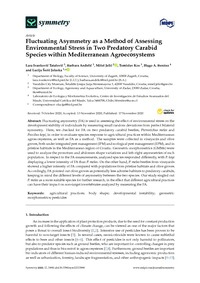Mostrar el registro sencillo de la publicación
Fluctuating asymmetry as a method of assessing environmental stress in two predatory carabid species within mediterranean agroecosystems
| dc.contributor.author | Ivanković Tatalović, Lara | |
| dc.contributor.author | Anđelić, Barbara | |
| dc.contributor.author | Jelić, Mišel | |
| dc.contributor.author | Kov, Tomislav | |
| dc.contributor.author | Benítez, Hugo A. | |
| dc.contributor.author | Šerić Jelaska, Lucija | |
| dc.date.accessioned | 2021-12-09T19:27:49Z | |
| dc.date.available | 2021-12-09T19:27:49Z | |
| dc.date.issued | 2020 | |
| dc.identifier.uri | http://repositorio.ucm.cl/handle/ucm/3541 | |
| dc.description.abstract | Fluctuating asymmetry (FA) is used in assessing the effect of environmental stress on the development stability of individuals by measuring small random deviations from perfect bilateral symmetry. Here, we checked for FA on two predatory carabid beetles, Pterostichus melas and Poecilus koyi, in order to evaluate species response to agricultural practices within Mediterranean agroecosystems, as well as FA as a method. The samples were collected in vineyards and olive groves, both under integrated pest management (IPM) and ecological pest management (EPM), and in pristine habitats in the Mediterranean region of Croatia. Geometric morphometrics (GMMs) were used to analyze the pronotum and abdomen shape variations and left–right asymmetries of each population. In respect to the FA measurements, analyzed species responded differently, with P. koyi displaying a lower intensity of FA than P. melas. On the other hand, P. melas beetles from vineyards showed a higher intensity of FA compared with populations from pristine habitats and olive groves. Accordingly, FA pointed out olive groves as potentially less adverse habitats to predatory carabids, keeping in mind the different levels of asymmetry between the two species. Our study singled out P.melas as a more suitable species for further research, in the effect that different agricultural practices can have their impact on non-target invertebrates analyzed by measuring the FA. | es_CL |
| dc.language.iso | en | es_CL |
| dc.rights | Atribución-NoComercial-SinDerivadas 3.0 Chile | * |
| dc.rights.uri | http://creativecommons.org/licenses/by-nc-nd/3.0/cl/ | * |
| dc.source | Symmetry, 12(11), 1890 | es_CL |
| dc.subject | Agricultural practices | es_CL |
| dc.subject | Body shape | es_CL |
| dc.subject | Developmental instability | es_CL |
| dc.subject | Geometric morphometrics | es_CL |
| dc.subject | Pesticides | es_CL |
| dc.title | Fluctuating asymmetry as a method of assessing environmental stress in two predatory carabid species within mediterranean agroecosystems | es_CL |
| dc.type | Article | es_CL |
| dc.ucm.indexacion | Scopus | es_CL |
| dc.ucm.indexacion | Isi | es_CL |
| dc.ucm.doi | doi.org/10.3390/sym12111890 | es_CL |



